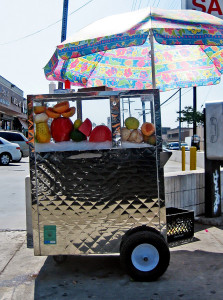
However, there’s also been some action in the LA Catholic Worker/LACAN v. City of LA/CCEA case. You may recall that the plaintiffs called for a hearing on January 11, 2016 over a motion to compel the City of Los Angeles to stop being so damned recalcitrant about handing over discovery material, and everybody seems super-tense about everything and mad at one another in a way that one doesn’t usually see with actual professional lawyers. Anyway, yesterday the plaintiffs filed a supplemental memorandum of law in support of their motion to compel, which makes for some interesting reading in the run-up to the hearing on the 11th.
TL;DR is that the plaintiffs accuse the City of LA of abusing the rule requiring parties to “meet and confer” over discovery matters by providing irrelevant material and so on in order to run out the clock on discovery. I’m convinced by their arguments, but obviously I’m biased. There’s also a hyper-meta discussion on whether the fact that an attorney directs the discovery process makes the documents used to coordinate the process into privileged attorney work-product. I’m sure I missed all the fine points, but I’m definitely convinced. These people will claim privilege for anything. Shameless. Find curated selections from the pleading after the break.
And don’t forget, throughout “Defendant” means “City of Los Angeles.” The Central City East Association is, as far as I can tell from the documents, cooperating with discovery.
Local Rule 37.1 requires parties to meet and confer prior to filing a motion to compel. The purpose of the meeting is to “eliminate the necessity for hearing the motion or to eliminate as many of the disputes as possible.” Specifically, Rule 37.1 requires the parties to meet and confer regarding “each issue and/or discovery request in dispute.” It does not, as Defendant insists, require the moving party to restart the Rule 37.1 process when Defendant provides supplemental responses.1 That is particularly true where, as here, Defendant’s supplemental responses simply restate the arguments made by Defendant during the meet and confer process about why it need not provide responsive documents.
1. Such a rule, taken to its logical conclusion, would allow a responding party to extend the meet and confer process indefinitely, because, as here, a party could simply provide supplemental responses that did not address the underlying dispute and then reset the requirements for Rule 37.1. In that case, as is almost the case here, a responding party could simply run down the entire discovery window and make it impossible for a party to move to compel during the allowable time to do so.
Defendant argues that it provided approximately 2000 pages of documents with its supplemental responses. However, the 1546 pages actually produced were not responsive to the specific RFPs [request for production] at issue in this motion. In fact, over 1400 pages were publically-available City Council files that relate to 2014 and 2015 City Council motions on topics largely unrelated to this case. With its supplemental production, Defendant did not provide Plaintiffs with a single email responsive to Plaintiffs’ requests.
2. The roughly 40 City Council files that made up over 90% of the documents produced in the supplemental production include, for example, the public file for a Motion designating the South LA Transit Empowerment Zone (Bates No. 6585-91); a Resolution that the City of Los Angeles supports Senator Feinstein’s Los Angeles Homeless Veterans Leasing Act of 2015 (Bates No.7314-26); and a Request to the Human Relations Commission to Report on its Organizational Changes and Resources. (Bates No.7491-95).
While a Court is not required to award fees where, for example, the motion arises from a legitimate legal dispute, Defendant’s written opposition further demonstrates why fees are justified here. Just as Defendant failed to engage in the meet and confer process in good faith, Defendant failed to make any substantive legal arguments that justify the ongoing refusal to produce responsive documents or that necessitated Plaintiffs bringing this motion or to requiring the Court to hear it. Defendant’s failure to provide any legal justification for its ongoing refusal to produce the most basic documents in this case evidences Defendant’s litigation tactic—to force Plaintiffs to bring this motion and to run down the discovery clock. Under these circumstances, the award of fees is justified, and the amount requested is supported by the record and in no small part, the amount of time Plaintiffs’ counsel spent attempting to resolve these issues through the meet and confer process.
Image of fruit cart has been released by its creator, Nathan Gray, under the CC BY-NC-SA 2.0 and is available via Flickr.
